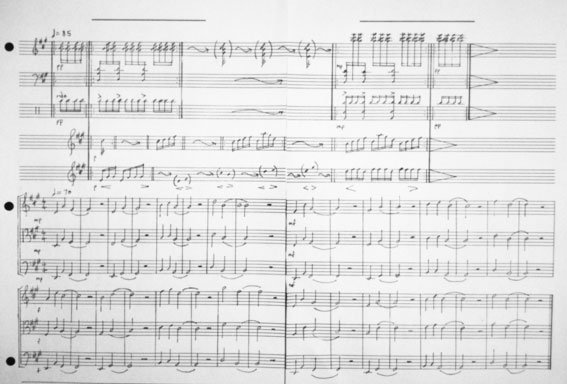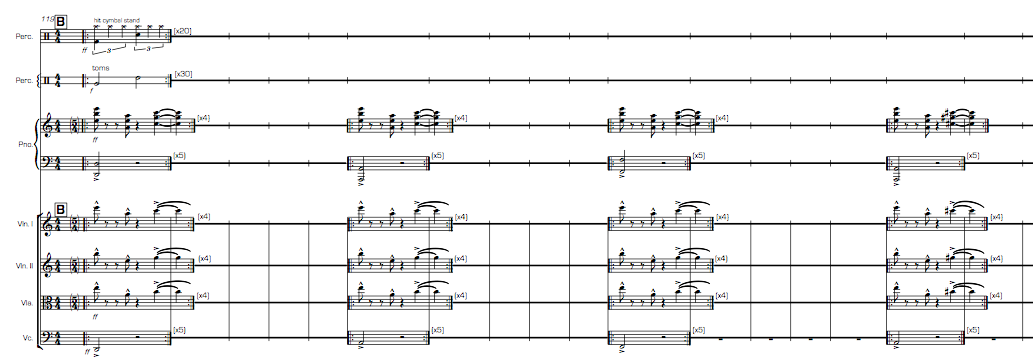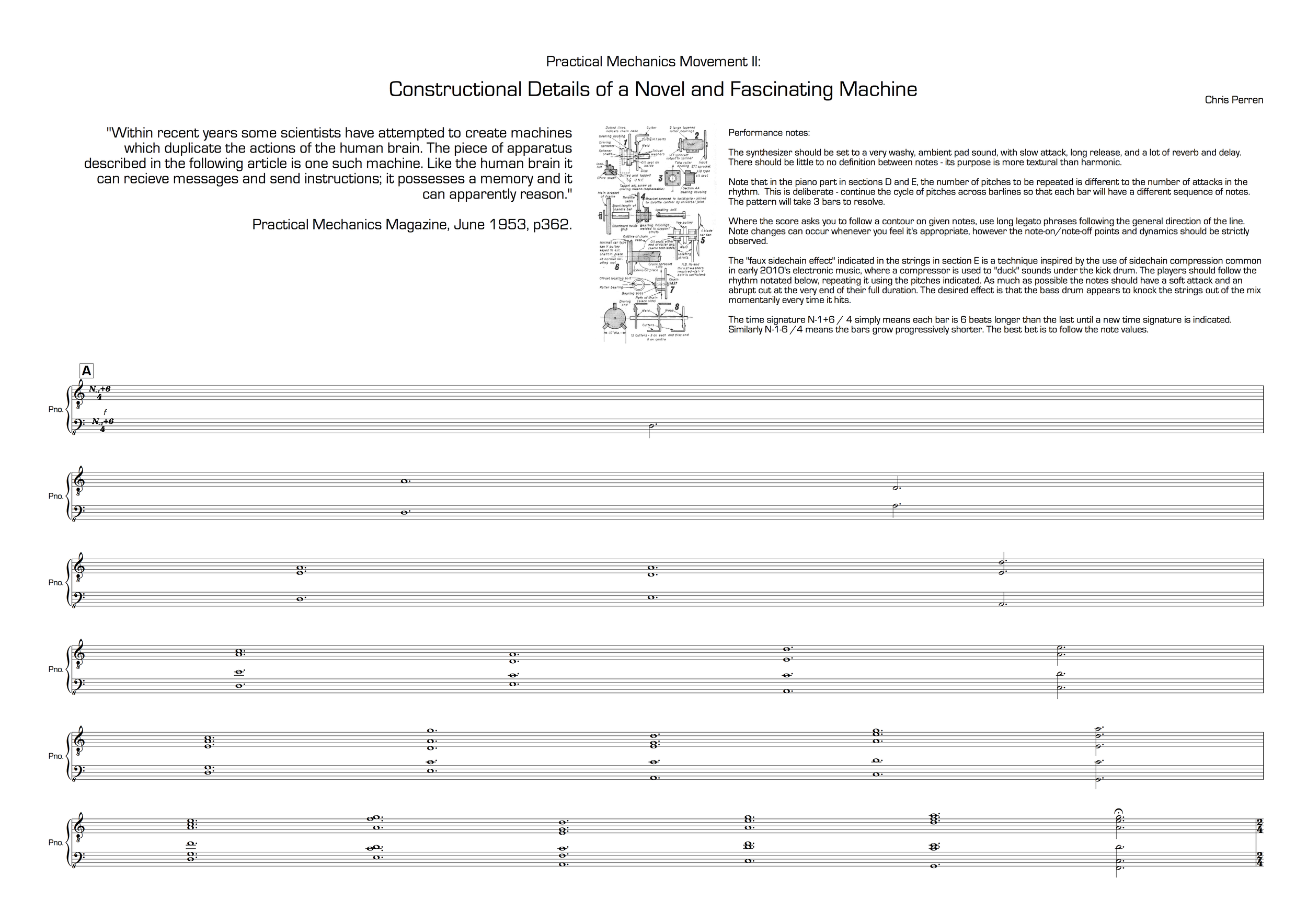Practical Mechanics (2012)
An ode to technological optimism in five movements.
I. The Great Awakening
II. Constructional Details of a Novel and Fascinating Machine
III. Hovercraft: Transport of the Future
IV. Photographing Noise
V. The Shape of Wings to Come
Duration: 24:00
Instrumentation: Piano, String Quartet, Guitar, Synth, Samples, Percussion, Voice
Premiere: Nonsemble at Practical Mechanics Launch, The Box, March 2013
Additional Performances: Nonsemble at Restrung Festival 2013
Release: Practical Mechanics Album (Digital, CD) via lofly recordings in partnership with UQ Faculty of Arts, March 2013. Buy on Bandcamp.
Premiere performance at the Box, West End, 2013
Program Notes
Practical Mechanics is an ode to technological optimism, and playfully explores the belief that science can solve all human problems. The titles and text excerpts are taken from the tattered pages of vintage issues of Practical Mechanics Magazine, a home science and technology magazine published between 1933 and 1963.The collision of hard scientific law with domestic human life, is reflected by the juxtaposition of mathematical and rule-based compositional approaches and the ineffably chaotic nature of human musical intuition. Practical Mechanics employs various rational and rule-based pattern-making techniques, including Schillingerian methods, list structures, additive and constructive techniques and others devised by the composer. This machine-like nature is especially prominent within the rhythm of the piece, and imbues the work with a complex yet controlled sense of mechanical determinacy. The harmony on the other hand is immediate and expressive, referring more to popular and folk music and reflecting the human needs central to the development and use of technology.
Covers from Various Issues of Newnes Practical Mechanics Magazine, edited by F. J. Camm: January 1953; June 1953; June 1956; April 1961; and March 1954.
Sketches and final pages from the Practical Mechanics score. Diagrammatic notations were used extensively, especially in the early development of ideas.
Reviews
Matthew Lorenzon, Partial durations, June 28 2013
Practical Mechanics was a British hobbyist magazine that ran from 1933 to 1963, providing instructions on how to build anything from a bathtub to an airplane alongside articles on the emerging technologies of the space age. Composer Chris Perren has marvellously painted the magazine’s techno-utopianism in a five-movement composition for his Nonsemble, drawing on the machinic rhythms and open harmonies of post-rock and minimalism.
Thanks to a beautifully-typeset score, the album can be performed by anyone with ready access to junk percussion, a sampler, a piano and a string quartet. Perren ingeniously overcomes the notational clutter of long, syncopated “simile” passages by giving each instrument’s cell, number of repetitions and cues in relation to the other instruments. The score is also a great pleasure to read alongside the album, with the notation realising the love of mysterious technical geometry proper to the period.
The first movement The Great Awakening opens with a piano thumping underneath a vintage vocal sample. The piano sounds like the mechanical heartbeat of the watch listed in the sample alongside the elevator, airplane and other modern inventions. Swelling strings punctuate the anxious piano before launching into multi-geared polyrhythms that reach their climax in a magnificent breakdown of harmonic and metrical modulations. This thrilling opening to an album suffused with cold-war nostalgia benefits from comparison with Kinetic Work, the opening of the Montreal viola and percussion grindcore duo Hanged Up’s album Kicker in Tow. While Perren’s polyrhythms provide a greater sense of tumbling, racing freefall than Hanged Up’s energetic changes, Hanged Up use rusty, grimy production values to cast a more cynical pallor over the era’s myth of progress. Like the chrome space-phalli adorning the covers of Practical Mechanics, Nonsemble’s album is impossibly shiny and almost saccharine in its major-mode tonality. It is itself a testament to the spread of affordable technology.
With all my love of technology (more! Better! Faster!) I cannot help thinking that the period in question—with its proliferation of nuclear armaments—and the myth of technological progress in general deserves a healthy dose of morose musical criticism, if only for the gothic-horror kicks. But this would be selfishly steering Perren and Nonsemble towards an entirely different set of musical reference-points, Godspeed You! Black Emperor and Lutoslawski rather than Mogwai and Glass.
Chris Cobcroft, 4zzz, 14 June 2013
I squeezed into the (literally) homely warmth of The Box in West End, converted from a residence to a venue using, largely, only the power of imagination. There's no bar, so Nonsemble (and Mr. Maps) frontman Chris Perren generously fronted me the use of a couple of his own beers. "We can't have a sober reviewer," he noted, astutely.
First up were Kathryn McKee and her string playing friends doing some of her singer-songwriter stuff, crossed over - appropriately for the occasion - with some of the instruments more commonly found in a chamber ensemble. The live environment took the edge off her usually very hi-fi production, which was nice.
Solo post-rocker Sadglint demonstrated just how intimate The Box really is by turning on his amp and removing the few remaining cilia my ears were holding on to. It's a good thing I like his music.
Taking a few minutes in the pleasant back yard area to solidify my melted head, I returned to find the many pieces of Nonsemble crammed on the 'stage'. They sold out the joint's admittedly modest, not to mention optimistic 80 head capacity, bringing together quite a few folks from both Brisbane's indie and young classical communities; ah, young-classical should be a genre, I think.
They started out with BMX Phase, a stand-alone piece live synced to a video of some dredded dude cutting sick flips on his bike. They carried off the split-second timing perfectly and to great acclaim from the packed audience, which they thoroughly deserved, a great piece.
The main event was the performance of their debut EP, Practical Mechanics. A brightly energetic salute to the technological optimism of the '50s, blurring the lines between mathematically calculated minimalism and the power of post-rock. For my money they actually carried off the, again, very complex timing better than they did in the recording studio, sounding very confident. The whole EP is a single piece, divided into five movements. In a classical context it would be inappropriate to clap between each one, but Chris told me he was really pleased when people applauded; so I did, and was rewarded with one of my classical world friends sitting next to me looking at me like "you're a total dickhead and I have a lower opinion of your intellect now."
No-one said it would be easy bridging the classical / indie divide. Intolerant friends not withstanding, Nonsemble did a pretty good job of it, certainly as far as the crowd was concerned. They finished the night with a taster of an even more ambitious work, a movement from a piece mathematically based on the moves of one of the world's most famous ever games of Go; yikes! I'm certainly looking forward to hearing more if it, the next time Nonsemble get out in front of a crowd.









